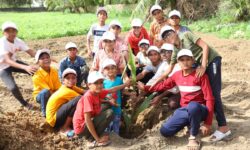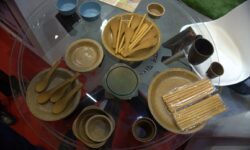KOCHI:
Kerala state is going through rapid urbanisation and the related solid waste management issues. Waste to Energy conversion technologies are the need of the hour in view of fuel scarcity and solid waste management problems.
The heavy moisture laden nature of Municipal solid waste (MSW) and the mixed nature of wastes during collection were identified as the thrust areas which need consideration in the municipal solid waste management system for the state of Kerala. The major hindrances towards the use of energy producing applications of municipal solid waste are high moisture content and low calorific value.
The moisture content in waste is adding up septic conditions and hence handling problems during collection, storage & transportation. Also, the use of auxiliary fuel is often necessary for the combustion of heavy moisture laden substrate which increases the economics of the energy production processes. Mixed municipal solid waste in raw state has a heating value in the range of 8-12 MJ/kg of which is one third of the calorific value of coal (25-30 MJ/kg).
The search for an efficient technology which will convert the raw MSW in to an energy enriched material as well as the need of technologies for mixed municipal solid waste treatment has led to ‘Biodrying Process’ as a sustainable option. Cochin University of Science & Technology has awarded a doctoral degree on “Biodrying :A Sustainable Technology for Municipal Solid Waste Management” recently to a research scholar Asha P Tom who was working under the guidance of Dr. Renu Pawels, Professor, Civil Engineering Department, CUSAT. Dr.Renu told that an Innovative Pilot scale biodrying reactor for treating mixed municipal solid waste (MSW) with high moisture content; was developed in collaboration with NIIST, CSIR, Thiruvanathapuram under the supervision of Dr.Ajit Haridas for this study.
This technology reduces the moisture content and increases the energy value of municipal solid waste by convective evaporation process, by utilizing the controlled aerobic reactions and the resulting biological heat. Innovative biodrying reactor developed for mixed MSW with high moisture content was found efficient with a significant weight loss of 41 % in 11 days of reaction. The average moisture reduction of 39 % and volume reduction of 38 % has been achieved in the designed system in 11 days of process.
Self heating temperature of 50 0 C to 60 0 C has been developed in the designed biodrying reactor matrix, which is ensuring pathogen free biodried output. The calorific value of municipal solid waste has been increased from the initial value of 10.06 MJ/kg to final value of 28.35 MJ/kg which is promising towards waste to energy applications of municipal solid waste. The main highlights of biodrying process are easy storage, sorting and transportation of municipal solid waste due to the reduced volume and moisture content.
Considerable reduction in odour and zero leachate are positive features of this process. Dr.Renu added that this technology promotes the use of energy enriched municipal solid waste as a fuel for waste to energy plants by reducing the moisture content, and will be a sustainable solution to manage municipal solid waste in cities like Kochi. This project was financially supported by Kerala State Council for Science Technology & Environment (KSCSTE).
In connection with waste to energy and waste to wealth concept and to promote the thought of Reduce, Re-use and Recycle, the division of civil Engineering, CUSAT in association with GJ Nature Care PVT Ltd, promoters behind the Kochi waste to energy plant is conducting a one day International workshop on “Sustainable Technologies for “Waste to Energy & Waste to Wealth – Challenges and Opportunities on 16 Dec 2019.




